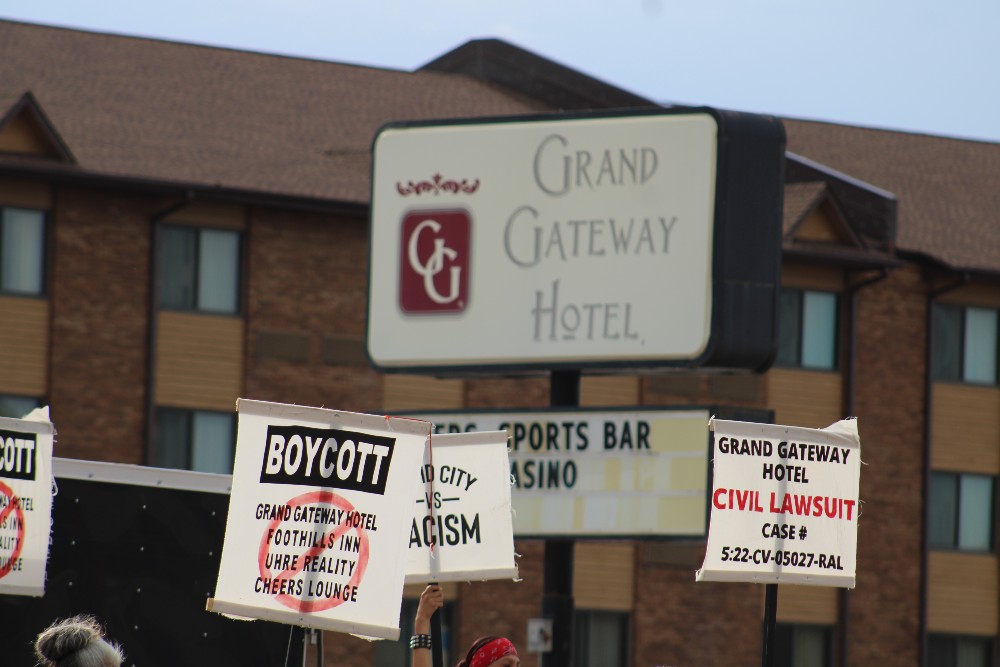
- Details
- By Darren Thompson
RAPID CITY—The racist comments a hotel owner made has spurred regular protests at the Grand Gateway Hotel in Rapid City, South Dakota. A group of people have demonstrated outside the hotel property every Monday, Wednesday, and Friday for the last 12 weeks.
On March 20, Connie Uhre, a co-owner of the Grand Gateway Hotel, made disparaging comments about Native Americans on the Mayor of Rapid City’s Facebook page, saying she is unable to distinguish “between a good Native and a bad Native.” She has also threatened to ban Native Americans from the property.
Led largely by NDN Collective, a not-for-profit Indigenous-led organization, protestors have been demonstrating outside the hotel rain or shine.
Sunny Red Bear, NDN Collective Director of Racial Equity, told Native News Online, “There is systemic racism that is happening all over this city. This accountability, here, is just the beginning.”
On March 23, NDN Collective filed a federal class-action lawsuit in U.S. District Court in South Dakota’s Western Division. The lawsuit contends that the Grand Gateway Hotel practices intentional racial discrimination after two Native American people tried to rent rooms at the hotel but were denied.
“We want the Department of Justice to shut down the Grand Gateway Hotel,” said Red Bear.
“What are the things that create the conditions for racism to continue to exist in Rapid City?” she asked. “It’s not holding people accountable.”
Uhre was arrested on May 27 for three counts of simple assault, after she sprayed a cleaning agent towards the faces of several demonstrators, including Red Bear. The incident was recorded and Uhre, 75, faces up to one year in jail and a fine of up to $2,000.
Rapid City mayor Steve Allender said in a statement that he condemns the statements made by Uhre.
A 2015 study on race disparities in Rapid City policing showed that Native Americans are arrested more often than any other group in the city and that police are more likely to use force against Native Americans than members of any other race.
More Stories Like This
Native News Weekly (August 25, 2024): D.C. BriefsNavajo Nation Mourns the Passing of Former Vice President Rex Lee Jim
Deb Haaland Earns Endorsement From Communications Workers of America Local 7076
University Soccer Standout Leads by Example
Two Native Americans Named to Democratic Congressional Campaign Committee's“Red to Blue” Program
Help us defend tribal sovereignty.
At Native News Online, our mission is rooted in telling the stories that strengthen sovereignty and uplift Indigenous voices — not just at year’s end, but every single day.
Because of your generosity last year, we were able to keep our reporters on the ground in tribal communities, at national gatherings and in the halls of Congress — covering the issues that matter most to Indian Country: sovereignty, culture, education, health and economic opportunity.
That support sustained us through a tough year in 2025. Now, as we look to the year ahead, we need your help right now to ensure warrior journalism remains strong — reporting that defends tribal sovereignty, amplifies Native truth, and holds power accountable.
 The stakes couldn't be higher. Your support keeps Native voices heard, Native stories told and Native sovereignty defended.
The stakes couldn't be higher. Your support keeps Native voices heard, Native stories told and Native sovereignty defended.
Stand with Warrior Journalism today.
Levi Rickert (Potawatomi), Editor & Publisher

